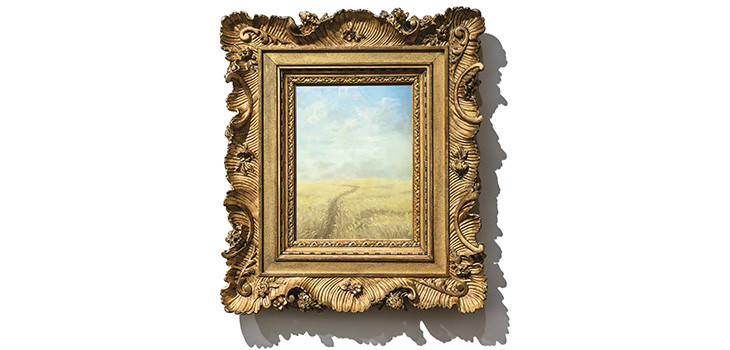Christopher McNall (of farms and farmland fame) and Stephanie Wickenden (curator of an art law specialism) describe how they discovered their niche practices with tips for developing yours
Christopher McNall:
My practice mainly involves farms and farmland – tenancy disputes under the Agricultural Holdings Act 1986, proprietary estoppel and Inheritance Act 1975 claims, and the dissolution of family farming partnerships. Here are my tips for developing your own niche practice:
1. Spot the chance when it comes along – and take it
I came to the area entirely by chance. I had never even heard of agricultural law, let alone studied it. Just out of pupillage, I took over a case from a colleague which involved a herd of cows killed by contaminated feed. I had to take a deep dive to educate myself, from scratch. Another case followed from the same solicitors – that one involving an agricultural tenancy (something else entirely new to learn about) – and then another (about a farming partnership) – and, almost 20 years later, here we are.
2. Learn from others’ expertise
No-one becomes an expert overnight, or can ever be an expert on everything. Never be afraid to ask. Fellow professionals – legal and non-legal – enjoy imparting their knowledge and experience, and, believe it or not, respect barristers who are prepared to say when they need a steer in getting their heads round something.
3. Join the professional body
There will usually be one. In my area of practice, it is the Agricultural Law Association which does not just include lawyers, but also surveyors, land agents and other rural professionals. Once you have joined, read its publications and website, take advantage of any training which it offers and go to its events.
4. Cast your bread widely on the waters
I always try and accept invitations to speak – you just never know who will be there.
5. Write, write, write
Writing and getting into print is a great way of honing your knowledge and enhancing your profile. It need not be cerebral. The most widely read piece I ever wrote was a review of Clarkson’s Farm on LinkedIn.
Something explicitly legal need not be long: for example, Law Brief Publishing publishes short monographs. I wrote a 60-pager on agricultural tenancies for beginners – no footnotes and designed to be read from end to end in three hours. Twenty-odd pounds on Amazon, and lay clients often turn up at conferences with a copy.
6. Learn the lingo
Almost every speciality has a dictionary or glossary: find one, and buy it. Remember that your legal niche is actually someone else’s livelihood, and so you need to know how it works, in the real world, in order to speak intelligently with your lay clients. I have a large collection of books about farming – crop husbandry, veterinary medicine, crop diseases, annual prices – to help me orientate.
7. Keep on learning
Keep up to date. I enjoy a daily ramble through BAILII or TNA for law, and Farmer’s Weekly for the rest. (I also did really enjoy both series of Clarkson’s Farm.)
8. Be better than your competitors
Easily said! Make sure you are accessible and responsive. Give realistic quotes and realistic timescales for the completion of work. Most disputes which solicitors deal with never get near a barrister. Be prepared to have a lot of conversations about cases which end up going nowhere, or where the solicitor just wants to talk over their take on things.
Stephanie Wickenden:
What led you to specialise in art and cultural property law?
The real question in my case is what led me to law at all, after I studied art history intent on a career in the art market. I attended a talk on art law at university which captured my attention by presenting a completely different perspective on analysing and valuing creativity. After getting some experience at an auction house and in gallery administration I decided working in the art market was not for me long term, but I was intrigued by the possibility of combining art and law.
How did you get into it?
I had never met a barrister until I undertook a mini-pupillage at an intellectual property (IP) chambers in my final university year, but I immediately felt that it was the route for me. I then opted for a second degree in law, rather than the conversion. Looking back, I am glad I did this because having a broad academic foundation in law has been especially helpful in my art cases which frequently span several legal areas.
When I was applying for pupillage, I was interested in art, IP and Chancery but at the time there seemed to be no chambers that did all of this work. I was fortunate to be able to obtain a mixed IP and Chancery pupillage. I then spent three years as an employed barrister across the IP and art teams in a top-ranked law firm, which was a fantastic way of getting exposure to a broader range of advisory and transactional art work.
What do you love about it?
I am often brought fascinating and complex issues which require a lot of thinking outside the box. I particularly enjoy art copyright cases involving non-traditional media where there is little precedent and artistic practice has developed quicker than the law.
I also love the diversity that my art law work brings to my practice. I undertake some non-contentious and purely advisory matters, and can find myself needing to refresh my knowledge on a variety of legal areas – often in the same matter. What can start as a copyright query may on closer scrutiny be a fraud and breach of directors’ duties case.
What you would suggest to others looking to specialise in art law?
The core of any art law specialism is expertise in one or more of the areas of law where disputes commonly arise in the sector: contract, professional negligence, intellectual property, fraud, tax and private client/estates. Given the breadth of legal issues which art-related matters can encompass, there is admittedly some degree of marketing in having an ‘art pedigree’ as a matter of marketing rather than necessity. However, it is essential to have a real understanding of the art and cultural property market, the establishments and the characters who populate them. While this could be said for any sector, is it especially true for what remains a fairly opaque and idiosyncratic industry, and a lot of time (and client frustration) is saved if lawyers are familiar with how galleries, dealers and museums are typically run.
By way of example: it is not uncommon to hear that the sale of a painting worth £5m was agreed orally over lunch with nothing but the restaurant bill in writing; expectations of documentary evidence certainly need to be adjusted; negotiating settlements can be difficult with artists whose identities are so intertwined with their production, and creative solutions need to be devised which prioritise integrity over money.
In terms of where to work, there is no discrete ‘art law’ chambers, but a number have a recognised niche. It can be helpful, but is by no means essential, if your chambers already has a recognised art and cultural property specialist.
What about other niche specialist areas?
With any specialist practice, it is important to build relationships with others working in that area. Fortunately, people who develop niche practices usually are passionate about their field and networking becomes a genuine sharing of ideas and passions. Look out for specialist law associations or interest groups, and go to as many events as possible.
Developing a niche practice in chambers
Date: 20 October 2023

Christopher McNall:
My practice mainly involves farms and farmland – tenancy disputes under the Agricultural Holdings Act 1986, proprietary estoppel and Inheritance Act 1975 claims, and the dissolution of family farming partnerships. Here are my tips for developing your own niche practice:
1. Spot the chance when it comes along – and take it
I came to the area entirely by chance. I had never even heard of agricultural law, let alone studied it. Just out of pupillage, I took over a case from a colleague which involved a herd of cows killed by contaminated feed. I had to take a deep dive to educate myself, from scratch. Another case followed from the same solicitors – that one involving an agricultural tenancy (something else entirely new to learn about) – and then another (about a farming partnership) – and, almost 20 years later, here we are.
2. Learn from others’ expertise
No-one becomes an expert overnight, or can ever be an expert on everything. Never be afraid to ask. Fellow professionals – legal and non-legal – enjoy imparting their knowledge and experience, and, believe it or not, respect barristers who are prepared to say when they need a steer in getting their heads round something.
3. Join the professional body
There will usually be one. In my area of practice, it is the Agricultural Law Association which does not just include lawyers, but also surveyors, land agents and other rural professionals. Once you have joined, read its publications and website, take advantage of any training which it offers and go to its events.
4. Cast your bread widely on the waters
I always try and accept invitations to speak – you just never know who will be there.
5. Write, write, write
Writing and getting into print is a great way of honing your knowledge and enhancing your profile. It need not be cerebral. The most widely read piece I ever wrote was a review of Clarkson’s Farm on LinkedIn.
Something explicitly legal need not be long: for example, Law Brief Publishing publishes short monographs. I wrote a 60-pager on agricultural tenancies for beginners – no footnotes and designed to be read from end to end in three hours. Twenty-odd pounds on Amazon, and lay clients often turn up at conferences with a copy.
6. Learn the lingo
Almost every speciality has a dictionary or glossary: find one, and buy it. Remember that your legal niche is actually someone else’s livelihood, and so you need to know how it works, in the real world, in order to speak intelligently with your lay clients. I have a large collection of books about farming – crop husbandry, veterinary medicine, crop diseases, annual prices – to help me orientate.
7. Keep on learning
Keep up to date. I enjoy a daily ramble through BAILII or TNA for law, and Farmer’s Weekly for the rest. (I also did really enjoy both series of Clarkson’s Farm.)
8. Be better than your competitors
Easily said! Make sure you are accessible and responsive. Give realistic quotes and realistic timescales for the completion of work. Most disputes which solicitors deal with never get near a barrister. Be prepared to have a lot of conversations about cases which end up going nowhere, or where the solicitor just wants to talk over their take on things.
Stephanie Wickenden:
What led you to specialise in art and cultural property law?
The real question in my case is what led me to law at all, after I studied art history intent on a career in the art market. I attended a talk on art law at university which captured my attention by presenting a completely different perspective on analysing and valuing creativity. After getting some experience at an auction house and in gallery administration I decided working in the art market was not for me long term, but I was intrigued by the possibility of combining art and law.
How did you get into it?
I had never met a barrister until I undertook a mini-pupillage at an intellectual property (IP) chambers in my final university year, but I immediately felt that it was the route for me. I then opted for a second degree in law, rather than the conversion. Looking back, I am glad I did this because having a broad academic foundation in law has been especially helpful in my art cases which frequently span several legal areas.
When I was applying for pupillage, I was interested in art, IP and Chancery but at the time there seemed to be no chambers that did all of this work. I was fortunate to be able to obtain a mixed IP and Chancery pupillage. I then spent three years as an employed barrister across the IP and art teams in a top-ranked law firm, which was a fantastic way of getting exposure to a broader range of advisory and transactional art work.
What do you love about it?
I am often brought fascinating and complex issues which require a lot of thinking outside the box. I particularly enjoy art copyright cases involving non-traditional media where there is little precedent and artistic practice has developed quicker than the law.
I also love the diversity that my art law work brings to my practice. I undertake some non-contentious and purely advisory matters, and can find myself needing to refresh my knowledge on a variety of legal areas – often in the same matter. What can start as a copyright query may on closer scrutiny be a fraud and breach of directors’ duties case.
What you would suggest to others looking to specialise in art law?
The core of any art law specialism is expertise in one or more of the areas of law where disputes commonly arise in the sector: contract, professional negligence, intellectual property, fraud, tax and private client/estates. Given the breadth of legal issues which art-related matters can encompass, there is admittedly some degree of marketing in having an ‘art pedigree’ as a matter of marketing rather than necessity. However, it is essential to have a real understanding of the art and cultural property market, the establishments and the characters who populate them. While this could be said for any sector, is it especially true for what remains a fairly opaque and idiosyncratic industry, and a lot of time (and client frustration) is saved if lawyers are familiar with how galleries, dealers and museums are typically run.
By way of example: it is not uncommon to hear that the sale of a painting worth £5m was agreed orally over lunch with nothing but the restaurant bill in writing; expectations of documentary evidence certainly need to be adjusted; negotiating settlements can be difficult with artists whose identities are so intertwined with their production, and creative solutions need to be devised which prioritise integrity over money.
In terms of where to work, there is no discrete ‘art law’ chambers, but a number have a recognised niche. It can be helpful, but is by no means essential, if your chambers already has a recognised art and cultural property specialist.
What about other niche specialist areas?
With any specialist practice, it is important to build relationships with others working in that area. Fortunately, people who develop niche practices usually are passionate about their field and networking becomes a genuine sharing of ideas and passions. Look out for specialist law associations or interest groups, and go to as many events as possible.
Christopher McNall (of farms and farmland fame) and Stephanie Wickenden (curator of an art law specialism) describe how they discovered their niche practices with tips for developing yours
Categories:
Career Clinic
SourceURL:
Links:







